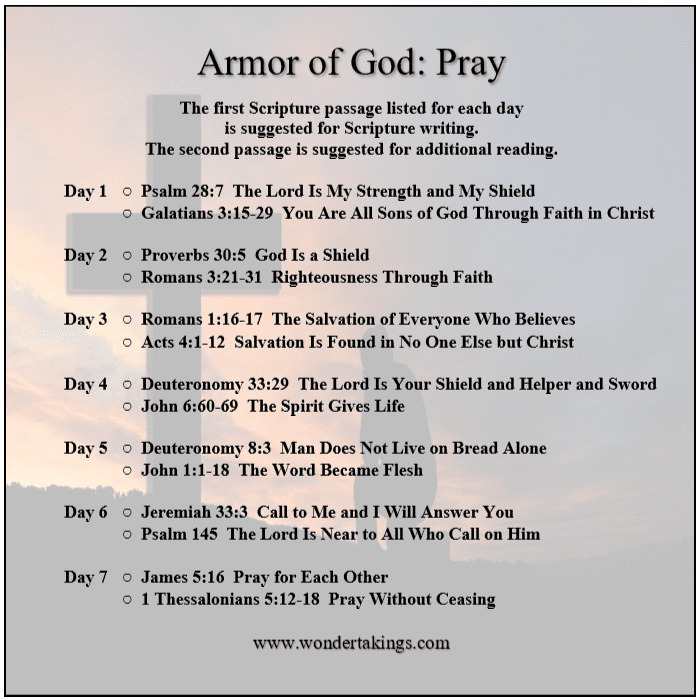The Armor of God (Part 2): Pray
“Pray in the Spirit at all times and on every occasion. Stay alert and be persistent in your prayers for all believers everywhere.”
Ephesians 6:18 NLT

We have been examining Ephesians 6:10-18. In this passage Paul intructs us to put on the “armor of God” so that we will be prepared to stand against evil. Last week, in “The Armor of God (Part 1): Stand“, we covered verses 10-15, which discuss truth, righteousness, and the gospel of peace:
“Finally, be strong in the Lord and in his mighty power. Put on the full armor of God, so that you can take your stand against the devil’s schemes. For our struggle is not against flesh and blood, but against the rulers, against the authorities, against the powers of this dark world and against the spiritual forces of evil in the heavenly realms. Therefore put on the full armor of God, so that when the day of evil comes, you may be able to stand your ground, and after you have done everything, to stand. Stand firm then, with the belt of truth buckled around your waist, with the breastplate of righteousness in place, and with your feet fitted with the readiness that comes from the gospel of peace.”
Ephesians 6:10-15 NIV
This week we continue our discussion “the armor of God” by looking at verses 16-18. These verses mention faith, salvation, the Spirit, the Word of God, and prayer. Let’s start with verses 16-17:
“In addition to all this, take up the shield of faith, with which you can extinguish all the flaming arrows of the evil one. Take the helmet of salvation and the sword of the Spirit, which is the word of God.”
Ephesians 6:16-17 NIV
The Shield of Faith

“Do not be deceived, Wormwood. Our cause is never more in danger than when a human, no longer desiring, but still intending, to do our Enemy’s will, looks round upon a universe from which every trace of Him seems to have vanished, and asks why he has been forsaken, and still obeys.“
C. S. Lewis, The Screwtape Letters
As I mentioned last week, in The Screwtape Letters C. S. Lewis writes a series of letters from the point of view of a demon named Screwtape instructing another demon named Wormwood how to turn humans against God, Whom the demons refer to as the “Enemy.” In the passage above, Screwtape explains the power of faith. Obeying God even when we don’t feel like it, even when we don’t feel Him around us, even when we are full of doubts — especially during these low periods — is one of the most effective ways to shield ourselves from evil and to please our heavenly Father.
William Barclay in his commentary on Ephesians 6:16 describes the shield:
“The word Paul uses is not that for the comparatively small round shield; it is that for the great oblong shield which the heavily armed warrior wore. One of the most dangerous weapons in ancient warfare was the fiery dart. It was a dart tipped with tow dipped in pitch. The pitch-soaked tow was set alight and the dart was thrown. The great oblong shield was made of two sections of wood, glued together. When the shield was presented to the dart, the dart sank into the wood and the flame was put out. Faith can deal with the darts of temptation. With Paul, faith is always complete trust in Christ. When we walk close with Christ, we are safe from temptation.”
In Hebrews 11:1 (NIV) we are given a definition of faith: “Now faith is confidence in what we hope for and assurance about what we do not see.” Here is that same verse in The Message version of the Bible: “The fundamental fact of existence is that this trust in God, this faith, is the firm foundation under everything that makes life worth living. It’s our handle on what we can’t see.” In The Student Bible Dictionary by Karen Dockrey, Johnnie Godwin, and Phyllis Godwin, the definition of faith is: “Belief, trust. . . . Faith in Jesus Christ is essential for salvation (Eph. 2:8-10). Faith is always active: It is a commitment of both mind and heart.”
So faith is belief and trust in God, confidence in what we hope for, assurance about what we can’t see, an essential part of salvation, and the foundation of our lives. Faith is always active and it is a commitment. This last part is what made the difference for me: faith is a commitment. Faith, like love, is not just something you feel (or don’t feel). It is something you do. It takes effort and practice. Even on the hardest days we can decide to have faith. We can decide to reach out to God in prayer whether we “feel” His presence or not. We can choose to read the Bible and listen for His voice. We can resolve to do the things He has already instructed us to do. And we can commit to doing this every day. God is always there. He won’t leave us. But He wants us to grow, so sometimes He stops “hovering” and gives us some space to learn how to walk on our own:
“You must have often wondered why the Enemy does not make more use of His power to be sensibly present to human souls in any degree He chooses and at any moment. But you now see that the Irresistible and the Indisputable are the two weapons which the very nature of His scheme forbids Him to use. . . . He leaves the creature to stand up on its own legs — to carry out from the will alone duties which have lost all relish. It is during such trough periods, much more than during the peak periods, that it is growing into the sort of creature He wants it to be. Hence the prayers offered in the state of dryness are those which please Him best. . . . He wants them to learn to walk and must therefore take away His hand; and if only the will to walk is really there He is pleased even with their stumbles.”
C. S. Lewis, The Screwtape Letters
God is pleased even with our stumbles. God doesn’t expect us to be perfect. If we fall, He will be there to help us get back up and try again. We just have to reach out and ask for His help. He wants us to keep trying, to keep stepping out in faith and trusting Him to strengthen us. There are some lessons we won’t learn the first time. Sometimes we have to fail before we learn how to succeed. God understands this. When we fail it’s tempting to quit, but that’s when we have to remember that failing is all part of the learning process. When we persevere through the low periods of failure or doubt, we learn how to strengthen our faith. And it’s important to keep our faith strong so that it won’t crumble when we face hard times. One of the things I find strengthening and comforting when I need to invigorate my faith is reciting the Apostles’ Creed. (Don’t worry, unless I’m at church, I just recite it in my head!) The Apostles’ Creed is a statement of beliefs written by the leaders of the early Christian church. Variations of this creed exist, but they all convery the same core Christian doctrines:
“The Apostles’ Creed”
“I believe in God the Father Almighty,
Maker of heaven and earth.
And in Jesus Christ, his only son, our Lord,
Who was conceived by the Holy Spirit,
born of the Virgin Mary, suffered under Pontius Pilate,
was crucified, dead and buried.
He went to the place of departed spirits.
The third day he rose from the dead.
He ascended into heaven, and sitteth at the right hand of God,
the Father Almighty,
from thence he shall come to judge the living and the dead.
I believe in the Holy Spirit;
the holy Christian Church;
the communion of saints;
the forgiveness of sins;
the resurrection of the body,
and the life everlasting. Amen.”
I believe. These are potent words, not just because they remind us of God’s power but because they let us access it. God is always right there, ready to help us. But He waits for us to ask. He won’t force Himself on us. When we open ourselves up to God by saying “I believe,” we give Him the opportunity to give us what we need. He will give us His wisdom, His strength, His love, His compassion, or anything else that’s required to face our challenges. He will even give us more faith if we ask for it. This is why it’s so important to keep trying, to keep making the effort to strengthen our faith, even when we don’t feel it. If necessary, as the saying goes, “Fake it ’til you make it!” We just have to take the first step. God will help us get the rest of the way. And when our faith is strong, we can face whatever comes.
“The Enemy’s human partisans have all been plainly told by Him that suffering is an essential part of what He calls Redemption; so that a faith which is destroyed by a war or a pestilence cannot really have been worth the trouble of destroying.”
C. S. Lewis, The Screwtape Letters
The Helmet of Salvation

“Unless our sin problem is solved once and for all, we can’t enter Heaven. That’s the bad news. But once that’s straight in our minds, we’re ready to hear the good news of Jesus Christ: Jesus took upon Himself, on the cross, the Hell we deserve so that we could experience for eternity the Heaven we don’t deserve!”
Randy Alcorn, Seeing the Unseen
William Barclay describes the helmet of salvation in his commentary: “There is salvation for a helmet. Salvation is not something which looks back only. The salvation which is in Christ gives us forgiveness for the sins of the past and strength to conquer sin in the days to come.” In The Student Bible Dictionary salvation is defined as: “Safety, deliverance from evil, eternal life. . . . Salvation comes only by God’s grace and through Jesus Christ when a person accepts Christ as Lord and Savior (Acts 4:12; Titus 2:11). It begins on earth and finds completion at death or at Christ’s return.”
Salvation means we are saved, but from what exactly? I thought I knew the answer to that question, but while researching this topic, I realized there is a lot more to it than I originally assumed. In “The Doctrine of Salvation” in The Portable Seminary, Reginald E. O. White discusses the comprehensive aspects of salvation. He explains that we are saved from sin and death, but also from guilt, ignorance, bondage, fear, despair, alienation, pressure, and a meaningless life. He notes that salvation is past, present, and future; God’s grace, given to us freely, is continually bestowed to sanctify us and bring us to Christlike perfection in “final glory.” He also distinguishes the various aspects of salvation: religious, emotional, practical, ethical, personal, and social. Salvation puts us right with God and grants us eternal life with Him. It includes the gift of His Holy Spirit and provides us with assurance, peace, courage, hopefulness, and joy. We are guided into new goals and convictions including compassion and Christlike love. Salvation brings us freedom, satisfaction, and fulfillment. Like I said, there’s a lot more to it than I thought!
Christian Believer, a study of church doctrine, examines salvation throughout the Bible: “Salvation history is the theological term for reading the biblical story as the narrative of God’s working out redemptive purposes for the world. The story’s plot assumes humans are lost, that something desires they be lost and works to that end, but also assumes that God wants our planet to be saved and has gone to epic lengths to bring this salvation to pass.” As explained in this study, the Old Testament shows God beginning His redemptive work through a chosen people, the nation of Israel. God intervenes to bring about peace, prosperity, and physical welfare and shows His eternal relationship to the human race. In the New Testament, God works through a new holy community: the church. Whereas the Old Testament focus is more on community, the New Testament emphasis is more on individuals and their response to God’s gift of salvation.
“The dominant issue in the New Testament portrayal of salvation — the issue that makes all other matters of preliminary consequence — is the role of Jesus Christ. He is named Jesus because the name means ‘savior,’ and he has come to ‘save his people from their sins’ (Matthew 1:21).“
J. Ellsworth Kalas, Christian Believer
Christian Believer gives this definition of salvation: “In its theological sense, salvation means God’s action in saving humans from the consequences of their sin and bringing them into right relationship with God.” But, as explained in this study, the term salvation is complex and has many aspects. Some other terms for or related to salvation are new birth, adoption, conversion, repentance, justification, redemption, and commitment. Ultimately, salvation is a transformation from our old sinful selves to a new life in Christ. Paul explains in Romans 6 that we must be dead to sin in order to be alive in Christ:
“For we know that our old self was crucified with him so that the body ruled by sin might be done away with, that we should no longer be slaves to sin — because anyone who has died has been set free from sin. Now if we died with Christ, we believe that we will also live with him. For we know that since Christ was raised from the dead, he cannot die again; death no longer has mastery over him. The death he died, he died to sin once for all; but the life he lives, he lives to God. In the same way, count yourselves dead to sin but alive to God in Christ Jesus.”
Romans 6:6-11 NIV
By examining all the different aspects of salvation, I don’t mean to make it sound complicated. It’s not. At its core, I believe it’s just a matter of accepting God’s invitation. As human beings, we are lost and living in a broken world. Because of His love for us, God sent His Son to save us from our wandering and show us the way back to Him. We just have to choose to take His hand and let Him lead us home.
“The Bible sees us as made in the image of God and a little lower than the angels. If that vision be true, we are living decidedly below expectation. And if we are to reach those expectations, we need help. That is, we need a Savior. And Christian doctrine says God has generously made that provision.”
J. Ellsworth Kalas, Christian Believer
The Sword of the Spirit

“For the word of God is alive and active. Sharper than any double-edged sword, it penetrates even to dividing soul and spirit, joints and marrow; it judges the thoughts and attitudes of the heart.”
Hebrews 4:12 NIV
Here is William Barclay’s commentary on the sword of the Spirit: “There is the sword; and the sword is the word of God. The word of God is at once our weapon of defence against sin and our weapon of attack against the sins of the world. . . . We can never win God’s battles without God’s book.” The Student Bible Dictionary defines word as: “Expression, statement, communication, speech (Deut. 32:1; Matt. 8:8). May be a single word or an entire message. In addition to the usual meanings, the word can be God’s revelation to people (Matt. 4:4). God’s Word includes His directions, purpose, will, and plan. God’s Word comes through the person Jesus Christ (who is the Word; John 1:1-5,14), through prophets and teachers (Mic. 1:1), and through personal revelation (2 Sam. 23:2; Rev. 1:1-2). The Bible is God’s Word (2 Tim. 2:15; 3:16-17).”
We can think of the Word of God as anything God says. For the most part, this is recorded in Scripture, so we usually think of the Word of God as the Bible. But we don’t want to forget about the other ways God speaks to us — through others, for example:
“And we will never stop thanking God for this: that when we preached to you, you didn’t think of the words we spoke as being just our own, but you accepted what we said as the very Word of God — which, of course, it was — and it changed your lives when you believed it.”
1 Thessalonians 2:13 TLB
And we don’t want to forget about the power God’s Word has. After all, His Word brought the entire universe into existence: “God spoke: ‘Light!’ And light appeared” (Genesis 1:3 MSG). Jesus Himself is called the Word in John 1:
“In the beginning was the Word, and the Word was with God, and the Word was God. He was with God in the beginning. Through him all things were made; without him nothing was made that has been made. In him was life, and that life was the light of men. The light shines in the darkness, but the darkness has not understood it. . . . The Word became flesh and made his dwelling among us. We have seen his glory, the glory of the One and Only, who came from the Father, full of grace and truth.”
John 1:1-5,14 NIV
Honestly, for me the concept of Jesus as God’s Word is still a little confusing. Here is some of the information I gathered in my research:
“The statement ‘The Word became flesh’ (John 1:14) relates Jesus both to God’s Wisdom in the Old Testament (which has a personal character . . .) and to God’s Law . . . as these are revealed and declared in the going forth of the Word by which God creates, reveals himself, and fulfills his will in history . . . . In the New Testament it becomes clearer that the Word is not merely a message proclaimed but is Christ himself.”
Ronald S. Wallace and Gene L. Green, “The New Testament Christology in The Portable Seminary
My study Bible also includes the following clarification for John 1:14:
“John used language with special meaning for both Greek and Jewish readers. In Greek philosophy, ‘word’ (logos) was a key term, often referring to the power of reason undergirding all creation. For Jews, too, ‘word’ had great significance, for God spoke his word to create the world and to transform his people. Yet John’s meaning passed beyond the Greek and Jewish ideas. . . .”
The New Student Bible, New International Version, Zondervan Publishing House; Notes by Philip Yancey and Tim Stafford
I didn’t finish quoting the study note above because I want to stop and let you digest everything for a second. If you are like me, you may be thinking at this point, That’s all very interesting, but I still don’t quite get it. If so, I hope giving you the rest of the quote will help: “An eight-year-old girl expressed it well. When asked why Jesus was called the Word, she said, ‘Because Jesus is all God wanted to say to us.’” That I can understand.
Now let’s get back to what is probably the most obvious meaning of the Word of God — the Bible. The Bible is not just an ordinary book. John R. W. Stott explains “three great words” which describe the unique nature of the Bible: “The three great words commonly used by Christians in this connection are revelation, inspiration, and authority.” Revelation means that God has chosen to make Himself known to us. Because His nature is so far beyond our understanding, this is the only way we can discover Him. While God reveals Himself in nature and in Christ, inspiration refers to the main way God has chosen to reveal Himself: by speaking through human authors. Authority is the power this written Word possesses. Because God spoke it, we can believe it. As Stott summarizes: “Our claim, then, is that God has revealed himself by speaking; that this divine (‘God-breathed’) speech has been written down and preserved in Scripture; and that Scripture is, in fact, God’s Word written, which therefore is true and reliable and has divine authority over us.” This is really amazing to me when I think about it! God went through all the “trouble” of having His words written down in a language we can understand so that we will know Him and know His plan for us. Whenever I feel confused about what God wants me to do and wish He would just tell me, I remember that He already has. It’s all in the Book!
“All Scripture is God-breathed and is useful for teaching, rebuking, correcting and training in righteousness, so that the servant of God may be thoroughly equipped for every good work.”
2 Timothy 3:16-17 NIV
Pray in the Spirit

“And pray in the Spirit on all occasions with all kinds of prayers and requests. With this in mind, be alert and always keep on praying for all the saints.”
Ephesians 6:18 NIV
Now we come to Paul’s final and most important instruction: pray. Pray in the Spirit with all kinds of requests. And pray for other believers who are in this battle with us. William Barclay’s commentary on this verse instructs us on several aspects of prayer:
“Finally, Paul comes to the greatest weapon of all — and that is prayer. We note three things that he says about prayer.
(a) It must be constant. Our tendency is so often to pray only in the great crises of life; but it is from daily prayer that the Christian will find daily strength.
(b) It must be intense. Limp prayer never got a man anywhere. Prayer demands the concentration of every faculty upon God.
(c) It must be unselfish. The Jews had a saying, ‘Let a man unite himself with the community in his prayers.’ I think that often our prayers are too much for ourselves and too little for others. We must learn to pray as much for others and with others as for ourselves.”
The Student Bible Dictionary gives the following definitions:
“Prayer. Talking and listening to God, an intimate fellowship with God (1 Kings 8:28; Matt. 21:22). Calls for faith and a right relationship with God (Ps. 66:18; Jas. 5:16). May include praising, thanking, confessing, asking, interceding (praying for someone else), and receiving.”
“Saints. Holy ones — set apart (Rom. 1:7; 1 Sam. 2:9). All true Christians are saints in the biblical sense of the word (Eph. 1:12-14; 1 Pet. 2:5,9). Not perfect people but those who have accepted Jesus as Lord and Savior (Phil. 1:1; 4:21).”
Prayer is awesome and powerful. It’s how we connect to our omnipotent God. God is at work in the world, but He doesn’t choose to work alone. He wants us to help Him. That’s why prayer matters. When we pray, we can change the world. That’s kind of a scary thought! But don’t worry, we have some help. The Holy Spirit, in addition to helping us hear God’s voice and understand His will, also helps us to pray:
“And in the same way — by our faith — the Holy Spirit helps us with our daily problems and in our praying. For we don’t even know what we should pray for nor how to pray as we should, but the Holy Spirit prays for us with such feeling that it cannot be expressed in words. And the Father who knows all hearts knows, of course, what the Spirit is saying as he pleads for us in harmony with God’s own will.”
Romans 8:26-27 TLB
So, once again, we don’t have to make this complicated. We just reach out to God and let the Holy Spirit help us from there. No matter what else God may ask of us, I believe the main thing He desires is our company. He wants to spend time with us, just being with us and letting Him fill us with His love. He is our Father. He just wants to hold His children and let us know everything will be okay. When we let go of ourselves — our own thoughts, desires, worries, and fears — and let the Holy Spirit take over and help us pray, we can commune with our heavenly Father on a truly spiritual level. As C. S. Lewis describes below, this incredible experience, if we are willing to seek it, can fulfill us and astonish us in ways we can’t even imagine!
“Once all his thoughts and images have been flung aside or, if retained, retained with a full recognition of their merely subjective nature, and the man trusts himself to the completely real, external, invisible Presence, there with him in the room and never knowable by him as he is known by it — why, then it is that the incalculable may occur. In avoiding this situation — this real nakedness of the soul in prayer — you will be helped by the fact that the humans themselves do not desire it as much as they suppose. There’s such a thing as getting more than they bargained for!”
C. S. Lewis, The Screwtape Letters
This week’s Scripture passages focus on the parts of God’s “armor” we discussed this week: faith, salvation, the Spirit, the Word of God, and prayer. There is a printer-friendly pdf version below the image. I have also included a video of the song “We Believe” by Newsboys. Their powerful song reminds us we are not alone in this spiritual battle. We have the Father, the Son, the Holy Spirit, and each other! So, as we are instructed in Ephesians 6:18 (NIV): “With this in mind, be alert and always keep on praying for all the saints.”

“A Fight to the Finish”
“And that about wraps it up. God is strong, and he wants you strong. So take everything the Master has set out for you, well-made weapons of the best materials. And put them to use so you will be able to stand up to everything the Devil throws your way. This is no afternoon athletic contest that we’ll walk away from and forget about in a couple of hours. This is for keeps, a life-or-death fight to the finish against the Devil and all his angels. Be prepared. You’re up against far more than you can handle on your own. Take all the help you can get, every weapon God has issued, so that when it’s all over but the shouting you’ll still be on your feet. Truth, righteousness, peace, faith, and salvation are more than words. Learn how to apply them. You’ll need them throughout your life. God’s Word is an indispensable weapon. In the same way, prayer is essential in this ongoing warfare. Pray hard and long. Pray for your brothers and sisters. Keep your eyes open. Keep each other’s spirits up so that no one falls behind or drops out.”
Ephesians 6:10-18 MSG
References:
- Alcorn, Randy. Seeing the Unseen, Expanded Edition: A 90-Day Devotional to Set Your Mind on Eternity. Multnomah, 2017.
- Barclay, William. The Letters to the Galatians and Ephesians. rev. ed., The Westminster Press, 1976. The Daily Study Bible Series.
- Catechism of the Unity of the Brethren. Published by the Synodical Committee as authorized by the Unity Convention of 1963, 1979.
- Dockrey, Karen, et al. The Student Bible Dictionary. Barbour, 2000.
- Kalas, J. Ellsworth. Christian Believer: Knowing God with Heart and Mind — Study Manual. Abingdon Press, 1999.
- Lewis, C. S. The Screwtape Letters & Screwtape Proposes a Toast. The Macmillan Company, 1971.
- The New Student Bible, New International Version. Zondervan Publishing House, 1992.
- “Newsboys – We Believe (Official Music Video).” YouTube, uploaded by newsboystv, 27 May 2014, www.youtube.com/watch?v=WjZ01FcK0yk.
- Stott, John R. W. “The Doctrine of Scripture: Introduction.” The Portable Seminary, edited by David Horton and Ryan Horton, Bethany House, 2006, pp. 22-24.
- Wallace, Ronald S., and Gene L. Green. “New Testament Christology.” The Portable Seminary, edited by David Horton and Ryan Horton, Bethany House, 2006, pp. 128-134.
- White, Reginald E. O. “Salvation in the New Testament.” The Portable Seminary, edited by David Horton and Ryan Horton, Bethany House, 2006, pp. 180-181.
Images:
- Kneeling at the Cross Featured image by Gerd Altmann from Pixabay
- Armor image by MikesPhotos from Pixabay
- Dueling Knights image by Enrique Meseguer from Pixabay
- Helmet image by Nadine Doerlé from Pixabay
- Sword image by azboomer from Pixabay
- Praying Hands image by Gerd Altmann from Pixabay